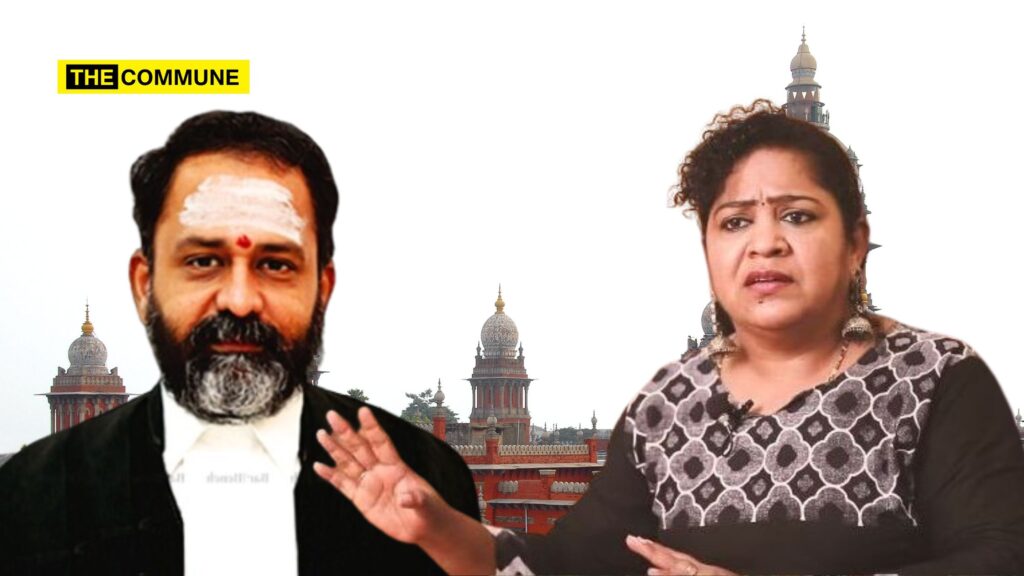Professor Sundaravalli, a Periyarist who identifies as a student of Ambedkar, EVR, and Marxism, has ignited controversy by attacking the reputation of GR Swaminathan, a sitting judge of the Madras High Court. She has been accused of depicting his judgments as biased and aligning with the RSS, even labelling him a “Sanghi” on her YouTube channel.
Recently, after the NTK criticized a song that mocked former DMK chief Karunanidhi, a series of complaints were filed with the Avadi and Pattabiram police. These complaints have led to charges being brought against Seeman under the SC/ST Prevention of Atrocities Act lodged on 30 and 31 August 2024, including sections 353 of the BNS and sections 3(1)(r) and 3(1)(s) of the SC/ST Act alleging that Seeman used a casteist slur during one of his rallies in the lead-up to the Vikravandi by-poll in July.
In a recent video on her YouTube channel, Sundaravalli criticized NTK chief Seeman but did not stop there. She crossed the line by attacking Justice GR Swaminathan, a Madras High Court sitting judge. Sundaravalli alleged that Justice Swaminathan is affiliated with the RSS and accused him of delivering biased judgments in favour of the BJP, even labelling him a “Sanghi.” She also claimed that the judge’s handling of the Tanjore student suicide case disparaged Christians and ridiculed their community. She says many of his judgments align with RSS and BJP interests. Sundaravalli further suggested that Justice Swaminathan’s praise of Sattai Duraimurugan was part of a scheme orchestrated by Seeman to influence the judge through RSS connections.
Sundaravalli commented, “When Sattai Duraimurugan was arrested and remanded over the song ‘Kala thanam konda Karunanidhi,’ Swaminathan, the honest judge said he shouldn’t be arrested in this manner.” She then laughed and continued her disparaging remarks, questioning, “Do you know who is this so-called honest Judge Swaminathan really is? An RSS man, raised in RSS, a Sanghi who pass judgments (favoring) BJP. He was also one of the mob that insulted Christians in the Thanjavur students death case. His judgement was to insult the Christians. If you looking at more of his judgments, it will be the judgment favouring the RSS, BJP mob. Now, how do I look at this judgment by him declaring Sattai Duraimurugan as being “very good”? It means it seems like a possible scheme orchestrated by Sattai Duraimurugan’s group, especially Seeman, to negotiate and bargain from the Sanghis and influencing Judge Swaminathan.”
நீதி அரசர் சுவாமிநாதன் அவர்களை சங்கி என்றும் ஒருமையிலும் விமர்சனம் செய்துள்ளார் @Sundara10269992 இது போன்ற விமர்சனத்தை பொது வெளியில் வைக்கும் போது நீதிதுறையின் மீது மக்களுக்கு எப்படி நம்பிக்கை வரும்?
வழக்கு பதிவு செய்யும் வரை பகிரவும்@Saattaidurai @tnpoliceoffl @chennaipolice_ pic.twitter.com/0im8Fgjuio
— Shahul hameed🎙️ (@tamilanshahul) September 1, 2024
Her claims, lacking substantial evidence, appear to be driven by political motives. This has led to increasing calls on social media for appropriate action to address the damage she has done to the judiciary’s reputation.
வன்கொடுமை தடுப்புச் சட்டத்தின் கீழ் சீமான் மீது வழக்கு
சீமான் கைது உறுதி
முதலமைச்சரோடு சீமான் கைது குறித்து போலீஸ் பேச்சு https://t.co/idaJlNZo4B pic.twitter.com/vWvbw08a8q— Dr. sundaravalli (@Sundara10269992) September 1, 2024
In 2019, the Supreme Court stated that assigning political motives to a judgment is tantamount to “an act of contempt of the gravest form.” In the case of Rustom Cowasjee Cooper v. Union of India (1970), a six-judge Constitutional Bench addressed contempt proceedings initiated due to newspaper reports of speeches criticizing a Supreme Court decision. The Court ruled that while fair and moderate criticism, even if strong, is permissible, attributing improper motives to judges or actions that bring courts into disrepute or obstruct their functioning constitutes serious contempt, which the Court will address.
Subscribe to our Telegram, WhatsApp, and Instagram channels and get the best stories of the day delivered instantly.

